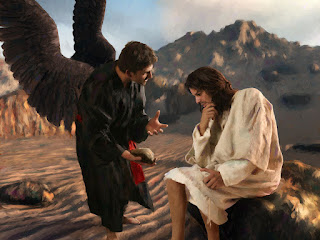What's to learn from the major 'Enlightenment' stories?
Estimated read time | 4 min
The similarities between the stories of 'Enlightenment' of Jesus and Siddhartha are so prominent that we could be speaking of the same story but in fact there were about 500 years of difference between them.
This could mean that there could be objective conclusions to be gathered from these accounts, specially when we also take into account modern ASC (Altered State of Consciousness) experiences reports which are leading us into the idea that there could be such a 'dark night of the soul' in the process of growing or evolving.
For one they both got here through 'fasting', this is a key factor in Buddhism and Siddhartha's story which somehow is a bit undermined in the story of Jesus, understandably given everything else in the story, from reviving death people to hovering over the sea (not that the Buddha didn't have alleged supernatural powers). However, the topic of fasting will be approached on the next article as it might be key to the modern study of ASC and it's connection to the 'divine'.
Another is that Enlightenment came right after the experience, for both parties this was the episode in their lives (or stories) where they gained the ultimate knowledge which lead them to preach their message and in both cases manifest psychic and paranormal phenomena.
However the most curious similarity was their encounter and interaction with the 'Devil' which in an odd turn of events was not set on destroying them (at least not directly) but to coerce them into something as if he/she had an agenda.
The similarities between the stories of 'Enlightenment' of Jesus and Siddhartha are so prominent that we could be speaking of the same story but in fact there were about 500 years of difference between them.
This could mean that there could be objective conclusions to be gathered from these accounts, specially when we also take into account modern ASC (Altered State of Consciousness) experiences reports which are leading us into the idea that there could be such a 'dark night of the soul' in the process of growing or evolving.
What exactly are the similarities?
For one they both got here through 'fasting', this is a key factor in Buddhism and Siddhartha's story which somehow is a bit undermined in the story of Jesus, understandably given everything else in the story, from reviving death people to hovering over the sea (not that the Buddha didn't have alleged supernatural powers). However, the topic of fasting will be approached on the next article as it might be key to the modern study of ASC and it's connection to the 'divine'.
Another is that Enlightenment came right after the experience, for both parties this was the episode in their lives (or stories) where they gained the ultimate knowledge which lead them to preach their message and in both cases manifest psychic and paranormal phenomena.
However the most curious similarity was their encounter and interaction with the 'Devil' which in an odd turn of events was not set on destroying them (at least not directly) but to coerce them into something as if he/she had an agenda.
The Devil wanted to prevent their 'Enlightenment'
It seems as if the Devil wanted to 'ground' them on Earth, he/she did not attack them but 'tempted' them as some interpret.
In the case of Jesus he challenged him with the words 'If you are the Son of God' (A common theme in the scriptures), he challenged Jesus to turn a stone into bread a very likely hallucination caused by starving in the desert for 40 days, then he challenged him to jump from a cliff, using verses from the old testament assuming angels would come to rescue him.
Jesus remained poised and gained resolve by using verses from the old testament likewise, claiming that 'Man shall not live by bread alone, but by every word that comes out from the mouth of God' and also claiming that 'You shall not test the Lord your God'.
Jesus remained poised and gained resolve by using verses from the old testament likewise, claiming that 'Man shall not live by bread alone, but by every word that comes out from the mouth of God' and also claiming that 'You shall not test the Lord your God'.
After that instead of challenging him, the Devil showed him 'all the Kingdoms' in the world and mentioned he could rule over all of these, again Jesus overcame the temptation and spelled Satan to 'Be gone' to end the experience.
A slight difference
In the case of the Buddha, the temptation came first, the Devil showed him visions of beautiful women hoping he would cave in, as Siddhartha remained poised, the Devil sent armies of demons at him, he remained still, unharmed as if it was just a dream, an illusion.
After these failed attempts the Devil challenged him, similarly to Jesus, he claimed that the 'seat of Enlightenment' belonged to him, to which his demons answered 'I am witness' and he told the Buddha, 'They answer for me, who will answer for you?'.
Siddhartha then touched the Earth gracefully as he remained in deep meditation and according to the story the Earth itself spoke: 'I bear you witness'. This is why the Buddha is often portrayed with one of his hands touching the ground.
In both stories the themes overlap, that of poise and resolve against fear and temptation, inner peace and conviction to their goal but then again a very specific role played by the 'Devil'.
The role of the Devil as master of this world
There is this common theme in ancient philosophies, like Gnosticism and as we can see Buddhism that the 'Devil' is the ruler of the world and as those in the path of 'Enlightenment' try to break free from such world, the Devil interferes using fear and temptation to 'ground' them to this plane.
In essence this could mean that instead of utter destruction and madness, the Devil had a plan for this world which has its subjects trapped in the wheel of 'Samsara' as the Buddhists call it but behind it all there could be higher possibilities past this realm as these two characters, after such experiences spoke of and traveled to 'heavens' above, this could also add to the idea that the Devil has a higher purpose on Earth, according to the 'Fallen Angel' theories and mythologies.
This is a theme that will be further explored in the -Outline-, and as modern ASC (Altered States of Consciousness) experiences reports stack, we can start drawing a more rational outlook between the rival forces at hand, as this 'Devil' figure starts to relate to the concept of 'Ego'.
More on the fasting story of Jesus and the Buddha...



